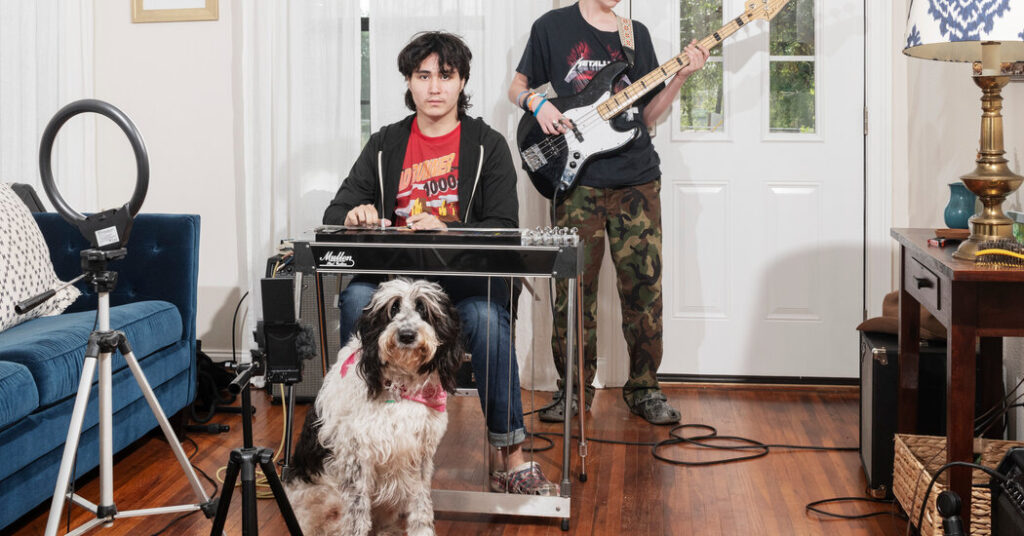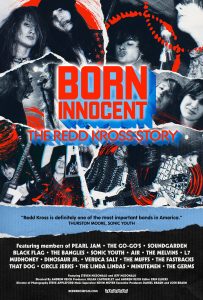Pedal Steel Noah’s Covers Charm Fans Online. Up Next: His Own Songs.

Like many American teenagers, Noah Faulkner, 16, is obsessed with music. He’ll spend hours going down rabbit holes, listening to every note played by his favorite artists and studying new discoveries. He recently came out of a monthslong deep dive on Clarence Ashley, a banjo player who recorded during the Great Depression and “makes me feel like I’m an old man,” Faulkner said. Ashley’s music “feels very spooky, and I imagine it’s like an abandoned place somewhere.”
Unlike most teenagers, Faulkner is translating these influences into a dedicated music career. Using the handle Pedal Steel Noah, he posts daily covers of ’80s New Wave and post-punk hits on Instagram and TikTok, interpreting the work of acts like the Smiths and Tears for Fears on one of the hardest instruments to master. Along the way, he’s made fans of Neko Case, Big Thief, Grandaddy’s Jason Lytle and scores of others drawn to his emotive playing and charming setup: a big Texas flag in the background, his brother, Nate, 13, on bass and a shaggy Aussiedoodle panting along.
In March, the brothers and their father, Jay, played several showcases during the South by Southwest festival in their hometown and opened for the Black Keys’ keynote address. Dressed in a Western shirt, black cowboy hat and the colorful Crocs that have become his signature footwear, Pedal Steel Noah put a Texas stamp on songs by Duran Duran and the Cocteau Twins.
“It was amazing,” he said via video call from the dinner table, his family gathered around him, “but it was exhausting. Hopefully, I can give myself a reward of a party for my friends.” On Monday, he’s taking the next step in his young career, releasing “Texas Madness,” an EP that includes three covers and two original tracks.
Faulkner, who is autistic, has nursed an intense curiosity about music for most of his life. As a small child, he would spend hours every day at the piano, experimenting with the pedals and listening to the sounds each key made. Later, his mother, Christine, said, “We put him in a speech pathology school, and he didn’t have any words at that point. One day the director runs out and says, ‘Noah sang a whole song!’ He sang before he really talked. That’s his first language.”
Faulkner’s interest in pedal steel stems from an early plunge into country music. “I was listening to George Strait when I wanted to listen to something that’s cheerful and faithful,” he explained. “I love the pedal steel in his songs. I like how sustained and ambient it sounds.” His music teacher, Bukka Allen (the son of the Lone Star artist Terry Allen), introduced the Faulkners to Lloyd Maines, who is something like Texas country royalty, having played with Robert Earl Keen, Joe Ely and both generations of Allens.
Maines helped the family find a good beginner’s pedal steel — a Mullen, the same brand he plays. After setting it up at their home, he gave Faulkner his first and only lesson, teaching him how to hold the bar, how to wear the picks and what each pedal does. “I played him an old Bob Wills song called ‘Steel Guitar Rag,’ which is a tricky song to play,” Maines recalled in a phone interview. “It took him a while to figure out how to hold the bar, but he played the basics of that song right back to me.”
Faulkner immersed himself in the history of the instrument, picking up techniques by emulating his favorite players and exploring the range of sounds that could be coaxed from its strings. After he started recording covers and original compositions in GarageBand and uploading videos to YouTube, his parents sensed an opportunity to introduce some structure into their son’s life — and possibly set him down a sustaining career path.
“He’s very good with schedules,” said Jay, who played bass and guitar in a “bunch of no-name bands” around Austin. “So we challenged him to do one video a day for a year. It was just to help him hone his craft as a musician. He started waking up in the mornings and we’d make a song and post it. We’d do it really fast.”
Those videos soon involved the entire family. Jay usually played acoustic guitar just offscreen, and after football season, when Nate no longer had practice, he learned to play bass, and settled into a spot just behind his brother’s left shoulder. When their dog, Kara, kept wandering into the shots, Christine kept her quiet with a piece of bacon held next to the camera. “I’m so glad I can do what I enjoy with my family all the time, every day,” Nate said. “It’s the best thing ever.”
At first Faulkner played country songs for a few thousand fans, but he soon branched out into new genres. Christine, who spent her teenage years in love with ’80s music, made a request. “After a lot of country covers, I said, ‘Can we just play something Mama grew up with?’” She requested something by the Cure, and they eventually settled on “Just Like Heaven.” Faulkner transformed the song into a dreamy honky-tonk two-step, and his audience ballooned into the tens of thousands.
That song “feels like teenage life,” Faulkner said. “I like playing the synth parts. I found out some minor chords can be confidence, and major chords are happy and emotional. Emotional music is good for people.”
He has quickly grown into a sophisticated player, balancing technical proficiency with artistic insight. Rather than simply re-create these old hits, he reinterprets them, using their familiar motifs to explore a particular mood or idea — an approach that dispels both novelty and nostalgia.
Tim DeLaughter, who invited Faulkner to open for his long-running punk choir the Polyphonic Spree, sees him as a distinctively Texas artist, one who takes the lessons as well as the liberties of older players. “It resonates Texas,” DeLaughter said in a phone interview. “Noah’s bringing in pop music from all over the place, but he’s putting this Texas air into it. That really resonates with me, because we are a whacked-out state that produces a lot of left-field art. At the same time, Noah does his own thing. There’s joy there.”
Pedal Steel Noah’s EP, “Texas Madness,” reinforces him as an artist in that Lone Star legacy, even if his source material originates thousands of miles away. He turns Joy Division’s emotionally strident “Love Will Tear Us Apart” into a day-dreamy road trip through Texas hill country. His two originals, “Cleopatra” and especially “Lucy & Dixie,” have the all-caps emotionalism of the local post-rock veterans Explosions in the Sky.
The family recorded the EP at a studio in nearby Dripping Springs, Texas, with Nate and Jay reprising their usual roles and Brian Beadle, a family friend, on drums. Despite never having worked in a studio, Pedal Steel Noah took immediate control of the sessions. “When he gets in the studio,” Jay said, “he’s like a machine. He was directing everything, telling me what to do, telling the engineer what he wants. He did 10 or 15 songs in three days. He’s very driven.”
His elder son agreed that making music is hard work. “My arms get really exhausted. The best thing to do is exercise. I do a lot of push-ups,” he said. “When it was over, I was definitely proud of myself.”
“Texas Madness,” named after an episode in the reality TV series Faulkner has been writing, will be released by Lightning Rod Records, a Nashville label run by a childhood friend of Jay’s. The label gave the Faulkners a unique record contract, which ensures all profits from Pedal Steel Noah’s releases — including the EP and a full-length album scheduled for late 2024 or early 2025 — go directly to Noah Faulkner himself.
“Once you hit 18, services for people with disabilities pretty much fall off a cliff, and adults with disabilities suddenly have very few options,” his mother said. “When we started all of this, we were just hoping that maybe Noah could be a studio musician. Maybe he could make a living. Maybe he could avoid the cliff. Now I’m hoping it might actually give him a social circle. As a mom, that’s all I ever wanted, was someone to play with him.”
Audio produced by Jack D’Isidoro.





